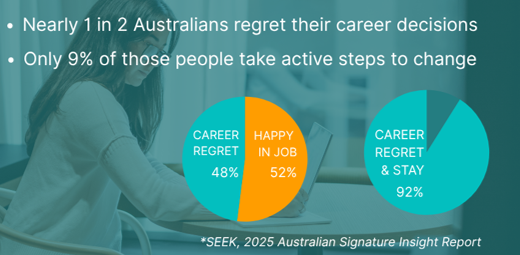A Recruiter’s Tips for Addressing Career Regret
Career regret is real and it’s more common than we think.
But what if regret isn’t a dead end, but a turning point?
According to SEEK’s 2025 Australian Signature Insight Report *, nearly half of Australians are experiencing some form of career regret. Often, this stems from financial decisions, shifting personal priorities, or that all-too-familiar feeling of having “fallen into” a job that no longer sparks joy.
Let that sink in. Half of Australians second guess the career they have ended up in.

Career regret isn’t unique to you, and it’s not only a fleeting feeling on your Monday morning commute. It is a persistent hum in the background of many lives.
And yet, most people stay put.
Read our latest blog: Why Australians Are Working Longer: "When Financial Reality Meets Career Passion to learn more about where this regret comes from.
In fact, fewer than 1 in 10 Australians experiencing career regret take action to change direction.*
The rest stay where they are, not because they want to, but because they don’t know where to begin.
But here’s what we want you to know: Career regret isn’t a dead end. What if it’s the starting line for something better?
The Psychological Weight of Regret & Why We Stay Put
Career regret doesn’t only impact job satisfaction, it reaches much further.
It affects our wellbeing, energy levels, motivation, and even how we see ourselves. And it rarely arrives loudly. It mostly surfaces subtly, as:
A lack of energy on Sunday night.
The quiet nagging thought, “Is this really it?”
Envy when you see someone doing work that they are passionate about.
A disconnect between who you are and what you do.
These are more than thoughts that underly our bad days. Left unaddressed they become long term emotional strain.
Regret can lead to anxiety, self-doubt, and even a crisis of identity, particularly when your sense of self is closely tied to career status or financial security.
So why do we stay?
Psychologists call it “status quo bias” – the human tendency to prefer familiarity, even if it’s uncomfortable, over the certainty of change.
Our inhouse High Performance and Wellbeing Director, Feyona Lau says on the topic:
Add to this financial pressure, social expectations and the fear of ‘starting over’, and it’s easy to see why people remain in roles that they are good at, but may no longer be serving them.
But here is what we have learned from working with thousands of professionals navigating this space:
You don’t have to overhaul your whole life to feel aligned again.
Regret as a Signal, Not a Setback
Regret gets a bad rap. But here at Sharp & Carter, we see that regret is useful.
Regret is data, information and insight. It’s your inner compass gently nudging you towards something that better fits who you are now.
Some of the most fulfilled professionals we’ve ever worked with have started the journey right here with career regret. The difference?
They treated regret as a starting point, not a stopping point.
“As recruiters, we meet so many people who feel weighed down by regret. But regret isn’t failure, it’s a signal. It’s your inner voice reminding you to listen to yourself, to learn, and to realign. It’s you saying that a shift is needed for something to feel right. The most rewarding changes often start with that moment of honesty.” |  |
So if you’re feeling it, ask yourself:
What is this feeling trying to tell me?
Have you outgrown a role that once felt right?
Have your values shifted?
Is this the first time you have ever really asked yourself what you want?
When reframed this way, regret becomes a springboard towards clarity and action.
Small Shifts, Big Momentum
We are conditioned to assume that a career change means blowing everything up, quitting your job, retraining, starting from scratch.
But that’s rarely the case.
We’ve seen firsthand how small, intentional actions lead to the most meaningful change. These micro movements are powerful because they reduce the emotional and financial risks. They focus on momentum not perfection.
Here are a few ways to move forward without flipping your life upside down:
☕Grab a coffee with someone in a different role or industry – Ask how they got there, what their day-to-day looks like and their advice for your pathway in.
💡Revisit your strengths and values – What energises you and lights you up? What feels easy? What matters most to you right now?
🛠️ Say yes to a new project at work – Even if it’s outside your usual scope, it might help you build new skills, test a different direction or open new doors.
🎓 Sign up for a short online course – It’s a low-commitment way to explore new skills and boost your confidence.
Remember, you don’t need to have it all figured out.
The point is to move, even just a little.
One step creates momentum, and momentum makes change feel possible and less scary.
What Employers Need to Know
If you’re a people leader, career regret doesn’t only impact individuals, it affects your business.
Employees who feel stuck or misaligned are twice as likely to disengage*, even if they don’t formally resign.
The upside?
Organisations that recognise and support internal career reflection to gain loyal, energised, purpose aligned employees.
Support doesn’t have to be complex. It can look like:
Facilitating job shadowing or skills development opportunities.
Encouraging open conversations around goals and career direction.
Promoting lateral moves or cross-functional secondments.
When employees feel safe to explore, they’re more likely to stay in their role as well as in your organisation.
So, what’s the takeaway? Regret Doesn’t Mean You Have Failed
Career regret is not a weakness. It’s not failure. It’s human.
You’ve changed. You’ve grown. Your work can evolve, too. And the best part?
You don’t need to leap. You can start small. A conversation. A course. A connection. Every small step counts.
Your future doesn’t have to mirror your past.
If you’re feeling the itch, listen to it.
Your next chapter might just be your most fulfilling one yet.
When you’re ready to take the next step
You don’t have to go it alone.
One of the most powerful things you can do is to speak to someone who understands the bigger picture, both the recruitment landscape, skills required and your personal goals. Someone who can help you connect the dots between where you are now and where you could go next.
That’s where we come in.
At Sharp & Carter we work with people, not resumes. We take the time to understand your story, your values, and your goals, so we can match you with roles that feel right for you.
Even if you’re not quite ready to move, the conversation itself can be clarifying.
Thinking about a change? Let’s chat.
Sources:
* SEEK, 2025 Australian Signature Insight Report, “The Evolving Working Life”


.png)



.png)
.png)
